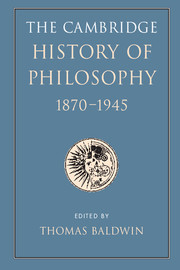Book contents
- Frontmatter
- Contents
- List of contributors
- Introduction
- I 1870–1914
- 1 Positivism, Idealism, and Pragmatism
- 2 Psychology and Philosophy
- 3 Logic, mathematics, and judgement
- 4 Philosophy and the new physics
- 5 The idea of social science
- 15 The debate over the Geisteswissenschaften in German philosophy
- 16 From political economy to positive economics
- 17 Sociology and the idea of social science
- 6 Ethics, politics, and legal theory
- 7 Philosophy of religion and art
- Interlude
- II 1914–1945
- Biobibliographical appendix
- Bibliography
- INDEX
- References
17 - Sociology and the idea of social science
from 5 - The idea of social science
Published online by Cambridge University Press: 28 March 2008
- Frontmatter
- Contents
- List of contributors
- Introduction
- I 1870–1914
- 1 Positivism, Idealism, and Pragmatism
- 2 Psychology and Philosophy
- 3 Logic, mathematics, and judgement
- 4 Philosophy and the new physics
- 5 The idea of social science
- 15 The debate over the Geisteswissenschaften in German philosophy
- 16 From political economy to positive economics
- 17 Sociology and the idea of social science
- 6 Ethics, politics, and legal theory
- 7 Philosophy of religion and art
- Interlude
- II 1914–1945
- Biobibliographical appendix
- Bibliography
- INDEX
- References
Summary
INTRODUCTION
For the larger part of its history, those practising what they think of as a ‘sociology’ have not intended to be doing ‘science’, and have not been taken by others to be doing so. It is true that Auguste Comte, who coined the neologism in the 1830s, did so to distinguish a kind of social understanding that would be consonant with what he took to be the modern esprit, and called it ‘positive’. It is also true that nearly two hundred years later ‘sociology’ is commonly thought of as one of the ‘social sciences’. Comte’s programme for the reorganisation of all knowledge, however, had no direct intellectual descendants, and to think of ‘sociology’ in the twenty-first century as a ‘science’ is to accept a classification that is more institutional, or instrumental, than intellectual. It would nevertheless be wrong to suggest that there has never been any such aspiration. There has, and this was perhaps at its strongest at the turn of the nineteenth and twentieth centuries. Even then, however, it was not pervasive. In Germany, the contemporary contrast was between the Naturwissenschaften and the Geisteswissenschaften, and although sociology might in practice have descended to empirical enquiry, and ordered the facts it discovered in the manner of what might be described as the administrative sciences, those who considered it in principle put it fairly firmly in the second of these two classes. In England and the United States, where the empirical impulse was stronger, the idiom in the later nineteenth and early twentieth centuries may have been that of ‘evolution’, but this merely described the conviction, in the one, that there was some sort of progression from the simpler societies to the more complex, in the other, that what drove modernity was the pursuit of interest and the competition between interests, a conviction that soon found it convenient, in a culture that did not think of itself historically, to talk instead of ‘pragmatism’.
- Type
- Chapter
- Information
- The Cambridge History of Philosophy 1870–1945 , pp. 245 - 252Publisher: Cambridge University PressPrint publication year: 2003



